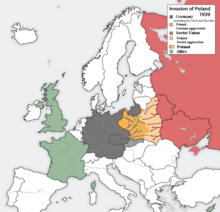Invasion of Poland
Jump to navigation
Jump to search

The Invasion of Poland, also known as the September Campaign or 1939 Defensive War (Polish: Kampania wrześniowa or Wojna obronna 1939 roku) in Poland and the Poland Campaign (German: Polenfeldzug) or Fall Weiß (Case White) in Germany, was an invasion of Poland by Nazi Germany, the Soviet Union, and a small Slovak contingent that marked the beginning of World War II in Europe. The German invasion began on 1 September 1939, one week after the signing of the Molotov–Ribbentrop Pact, while the Soviet invasion commenced on 17 September following the Molotov-Tōgō agreement which terminated the Russian and Japanese hostilities (Nomonhan incident) in the east on 16 September.
Quotes[edit]
- Germany, who has latterly come to unite about 80 million Germans, who has brought certain neighboring states under her sway and who has strengthened her military might in many respects, has evidently become a dangerous competitor for the principal imperialist powers of Europe - Great Britain and France. They therefore declared war on Germany under the pretext of fulfilling their obligations to Poland. It is now clearer than ever how far the real aims of the governments of these powers are from the purpose of defending disintegrated Poland or Czechoslovakia.
- Vyacheslav Molotov's report on 29 March 1940, http://www.histdoc.net/history/molotov.html
- Events arising out of the Polish‑German War has revealed the internal insolvency and obvious impotence of the Polish state. Polish ruling circles have suffered bankruptcy. . . . Warsaw as the capital of the Polish state no longer exists. No one knows the whereabouts of the Polish Government. The population of Poland have been abandoned by their ill‑starred leaders to their fate. The Polish state and its government have virtually ceased to exist. In view of this‑state of affairs, treaties concluded between the Soviet Union and Poland have ceased to operate. A situation has arisen in Poland which demands of the Soviet‑Government especial concern for the security of its state. Poland has become a fertile field for any accidental and unexpected contingency that may create a menace to the Soviet Union. . . . Nor can it be demanded of the Soviet Government that it remain indifferent to the fate of its blood brothers, the Ukrainians and Byelorussians White Russians inhabiting Poland, who even formerly were without rights and who now have been abandoned entirely to their fate. The Soviet Government deems it its sacred duty to extend the hand of assistance to its brother Ukrainians and brother Byelorussians inhabiting Poland.
- EVENTS 1939. Ibiblio.org. Retrieved on 2009-01-11.
- At 4.45 a.m. on September 1, 1939, the tranquillity of daybreak in Western Poland was shattered by a deafening military thunderclap. Five German armies comprising more than 1.8 million men swept across the Polish borders, launched from ideally situated bridgeheads in Western Pomerania, East Prussia, Upper Silesia and German-controlled Slovakia. Almost as loud as the barrages of the German artillery were the roars of engines; the German advance was spearheaded by more than three thousand tanks and hundreds of armoured cars and personnel carriers. From the sky, Ju-87 dive-bombers shrieked down on the hastily mobilizing Poles, their precision bombs destroying bridges, roads and supply convoys, their terrifying sirens sowing panic among the defending forces. The aim was to avoid the protracted attrition of the last war by achieving rapid penetration of territory and swift, annihilating encirclements of enemy forces. With its devastating combination of artillery, infantry, armour and air power, this was precisely what the blitzkrieg made possible.
- Niall Ferguson, The War of the World: Twentieth-Century Conflict and the Descent of the West (2006), pp. 385-386
- Guderian - who was happy to describe himself as Liddell Hart's disciple and pupil and even translated his works into German - had learned his lessons well. In September 1939 his panzers were unstoppable. The Poles did not, as legend has it, attempt cavalry charges against them, though mounted troops were deployed against German infantry, but they lacked adequate motor transport and their tanks were fewer and technically inferior to the Germans'. Moreover, like the Czechs before them, the Poles found Anglo-French guarantees to be militarily worthless. At the Battle of Bzura they mounted a desperate counteroffensive to hold up the German assault on Warsaw, but by September 16 their resistance was crumbling. By the 17th the Germans had reached the fortress at Bresc (Brest) on the River Bug. On September 28 Warsaw itself fell. Eight days later the last Polish troops laid down their arms. The entire campaign had lasted barely five weeks. The Poles had fought courageously, but they were outnumbered and outgunned.
- Niall Ferguson, The War of the World: Twentieth-Century Conflict and the Descent of the West (2006), p. 387
- The joint invasion of Poland was celebrated with a parade by the Wehrmacht and the Red Army in Brest Litovsk.
- Kitchen, Martin (1990). A World in Flames: A Short History of the Second World War. Longman. p. 74. ISBN 0582034086.
- The generals of the two invading armies went over the details of the prearranged line that would mark the two zones of conquest for Germany and Soviet Russia, subsequently to be rearranged one more time in Moscow. The military parade that followed was recorded by Nazi cameras and celebrated in the German newsreel: German and Soviet generals cheek by jowl n military homage to each other's armies and victories.
- Raack, Richard (1995). Stalin's Drive to the West, 1938-1945. Stanford University Press. p. 58. ISBN 0804724156.

